Perhaps you are lazing off on your sofa scrolling endlessly on your phone and trying to kill time without doing anything productive. Another day wasted, indeed. You can do this repeatedly, or you may opt to learn a new skill by downloading a learning app on your phone instead. A prime example of such a learning app is Coursera. At last, you won’t have to go out and enroll in a school just to learn new things. In this Coursera review, we’ll dive into its notable features, course pricing, and determine if it’s worth enrolling in courses on this online platform.
Related: Best Language Learning Apps
Inside This Article
- What Is Coursera?
- Coursera Price List
- Compatible Devices with Coursera
- Classification of Courses
- Recommended Courses in Coursera
- Coursera Review: Is It Worth Enrolling?
- Pros and Cons of Using Coursera on Mobile
- Alternative MOOC Platforms
- The Bottom Line
What Is Coursera?
Coursera is one good example of a massive open online course (MOOC) provider, which offers an avenue for learning new skills online. It works with universities like Yale and the University of Michigan to develop alternative and cost-effective ways of earning new skills and degrees that help someone land a job.
These courses are oftentimes at par with the university-level of teaching. This translates to a higher quality of education you can attain online. It’s like learning at a Sunday school without going to the school itself. All you need to do is watch and learn video lectures compiled by professionals in their field.
Coursera topics are vast and discuss everything: from complicated courses like computer programming, machine learning, and accounting, to the most basic life skills such as cooking and foreign language skills.
Coursera Price List
Ready to learn that new skill you’ve been eyeing to learn for a long time? Before we dive into the features of Coursera, let us check Coursera’s pricing first. This will help you choose the best deals on the platform.
To get an idea of, here’s the pricing table for Coursera’s offered courses:
| Individual Courses | $29-99 with a certificate; some free courses without a certificate |
| Guided Projects | Starts at $9.99 (1-2 hours) |
| Specializations | $39 per month (1-3 months) |
| Professional Certifications | $39 per month (1-6 months) |
| Coursera Degrees | Starts at $9,000 per course (2-4 years) |
| MasterTracks | Starts at $2,000 per course (4-7 months) |
| Coursera Plus | $399 per year |
Compatible Devices with Coursera
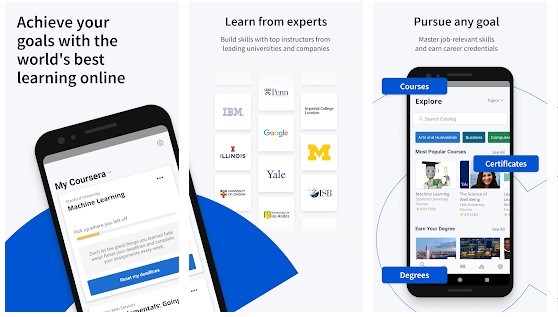
Coursera aims that everyone can learn a new skill anytime, anywhere. That is why Coursera is accessible to many modern devices.
These are the devices compatible with Coursera:
- PC
- Mac
- Android
- iOS
- iPadOS
Classification of Courses
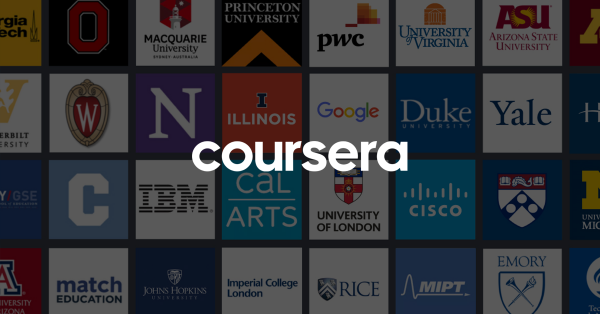
The courses and their corresponding prices may appear confusing for some. To help you with this dilemma, here’s a classification of their courses with their corresponding features.
Individual Courses
The great news is hundreds of Coursera’s online courses are free of charge. Keep in mind that most of these courses won’t give you a certificate or assess your learning through quizzes and exams. This can mean invalidation to your skills when, say, applying for a new job.
You must pay a certain fee if you want to enroll in individual courses and get the course certificate for your course. This will cost you around $29-$99 depending on the length and rigor of your chosen course.
There are also leveled-up individual courses called “Specializations” that are more focused on special skills. You may take these Specializations individually, but there’s a better deal for that.
Guided Projects
Learning things related to your career can get frustrating. It can result in an information overload, hence your brain may not absorb anything. Luckily, Guided Projects by Coursera can help you ease that burden. You can easily study job-related programs without the hassle of staying up all night. Coursera claims you can finish most of these Guided Projects in two hours max. This makes it effortless when learning a new skill to augment your job skills.
Guided Projects is still fairly new to Coursera, thus the projects are still limited in number. Hopefully, Coursera will expand the number of Guided Projects for those who want to sharpen their job skills.
Coursera Plus
There’s also a subscription-based service by Coursera aptly named “Coursera Plus.” This is suitable for those who want to undergo “Specializations” courses. This is also the right fit for those who want to take multiple courses all at once.
Subscribing to Coursera Plus unlocks almost all of the 3,000 courses on this platform. The price of this subscription service is $399 per year. That is a true steal especially if you are that hungry for knowledge.
Professional Certifications
Professional certifications are also available in this MOOC provider. These certifications are considered supplemental for your career. Lectures included within these courses discuss topics that are related to your career. This will help you refresh or sharpen your skills within your chosen career path.
Let’s say you’re a web developer looking to learn back-end development. Instead of taking another full-fledged course, you can get a certificate for that particular skill. This will save you time, money, and effort because you are only chasing after back-end development.
Degrees and MasterTracks
Coursera also offers full-fledged “Degrees” and “MasterTracks.” Coursera Degrees are university-level courses that can be legitimately applied to your career path.
“Degrees” is equivalent to a bachelor’s degree, thus can be used to apply for that niche job opening or further studies. MasterTracks, on the other hand, offers a master’s degree-level of learning that is recognized by most universities and colleges worldwide. This gives you the edge on the ever-competitive academic scene — all thanks to your phone.
Recommended Courses on Coursera
Learning a new life skill has never been this easy. If you’re now ready to dive into learning new skills for your work or just additional wisdom, here’s our recommended list of the best courses you can get on Coursera:
1. Machine Learning

If you want to know how your phone studies your day-to-day activities, Coursera’s Machine Learning course is the right path for you. Machine Learning discusses how computers learn from their daily experiences, from your scrolling activities on your news feed to app recommendations on the Play Store or App Store. Don’t be afraid of its seemingly technical terms. The course discusses Machine Learning in the most humane and layman-like as possible, thus letting everyone know how AI works without that information overload.
This course is currently being offered for free by Coursera. It is made by one of the Coursera founders Andrew Ng, a professor from Stanford University.
2. Programming for Everbody: Getting Started with Python
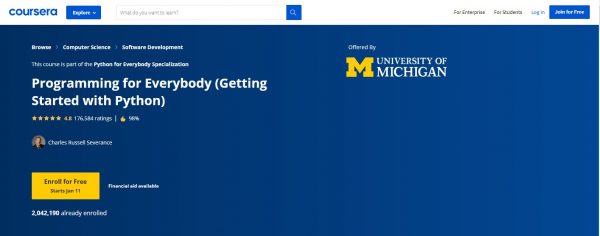
Computer programming may get the impression that it is difficult and needs a lot of logical thinking. But it can turn out to be pretty easy if you start on the right programming language. Python is one of the easiest languages and Coursera offers this course made by the University of Michigan. This program will teach you how Python works, how to build your first program with Python, and the pros and cons of using this programming language.
Just like the Machine Learning course, this program is given for free by Coursera. It is made by Professor Charles Severance of the University of Michigan.
3. Learning How to Learn
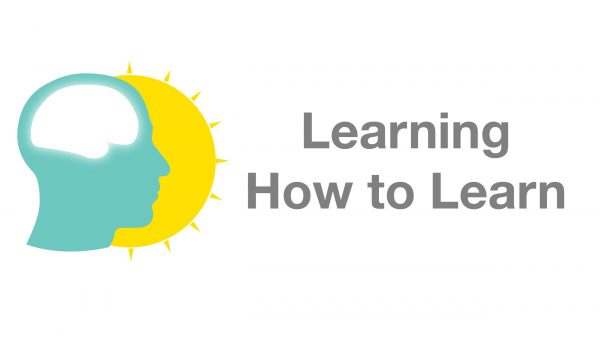
Wanting to shift your knowledge but struggling to learn anything new? Learning How to Learn can help you with learning new subjects you are aiming to study. It gives you discussions that reveal the truth of how your mind works. Memory tools, thinking techniques, and mental strength recognition are all discussed in this course. This will no doubt change the way you learn and absorb things.
The great news is you can learn this course for a whole day. You can study, watch, and take the assessments if you’ve got a whole free day by yourself because this course runs for only 12 hours. The even greater news is that it is completely free. Learning How to Learn is compiled by experts from UC San Diego.
4. The Science of Well-Being
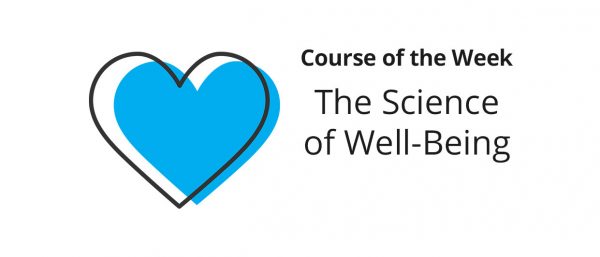
We all need happiness right now, especially with the continually ravaging pandemic. But happiness can sometimes be an overused word and we end up being more stressed. The Science of Well-Being aims to change your perspective about happiness. It lets you learn the ways how to approach happiness. From lectures to reflections, this will teach you that happiness doesn’t always come as expected. So, you must learn how to strategize and acquire happiness even in these daunting times.
This course is free for those who wish to enroll, made by Yale University and presented by Prof. Laurie Santos.
5. Google IT Support

Get ready to jumpstart your career in the IT industry with Google’s IT support course. This course introduces you to the routine of IT support specialists from troubleshooting technical problems, system administration, customer service, and many more.
This course can take up to six months of studying. It is made by Grow with Google and it is offered for free for all.
Coursera Review: Is It Worth Enrolling?
Now, let’s get on to the perks and disadvantages of Coursera. Is Coursera worth it? Is learning through this online platform comprehensive enough? We shall see if Coursera is truly worth your while.
Adore
- Flexible learning curve with a choice between self-paced or scheduled classes
- Collaboration with renowned learning institutions and companies worldwide (Yale, Stanford, UC, Oxford, Google, IBM, etc.)
- Legitimate certifications that can be added to your career portfolio
- Tons of free courses
- Competitively-priced tuition fees compared to enrolling in a university
- Course available in different languages
- Financial aid available for low-income learners
DISLIKE
- Questions about the lessons cannot be answered directly by the instructor
- Some Coursera Degrees and MasterTracks are way too expensive
- Student forums tend to be not friendly with learners
- Confusing classification on pricing
- Inflexible payment scheme on some courses (full upfront payment upon enrollment)
- Some assignments are peer-graded, which can be a nest for plagiarism
Even with all the issues about Coursera, this MOOC provider is still as comprehensive as learning in a university. Thanks to its partnerships with respected universities and corporations, you need not worry about learning information that is relevant to today’s trends.
Pros and Cons of Using Coursera on Mobile
Since Coursera is available on mobile devices, some of you might wonder: how does Coursera work on mobile? Can you learn effectively with just your smartphone?
We have outlined the advantages and disadvantages of using Coursera on your mobile phone.
Adore
- You can study short courses for a whole day without going in front of a computer
- Study anytime, anywhere without bringing a laptop
- Download courses for offline studies
- Perfect for those who don’t have a PC or laptop
DISLIKE
- Small screen, especially if you are studying IT-related courses
- Some tasks may need a PC to complete the assessment
- Less powerful compared to a PC, especially when multitasking
Overall, using Coursera on a phone can be beneficial especially if you’re in a hurry or on the go and traveling light. This is especially true for courses related to humanities, social sciences, and the like.
But if you are taking an IT course, better set up your PC. These programming courses will surely require a computer all the time when programming.
Alternative MOOC Platforms
If you find Coursera to lean a little bit on the expensive side, or you just find Coursera’s offerings to be not that comprehensive, here are other MOOC providers that almost have the same learning models as Coursera.
These are your top alternatives to Coursera that gives the same service as theirs:
Udemy
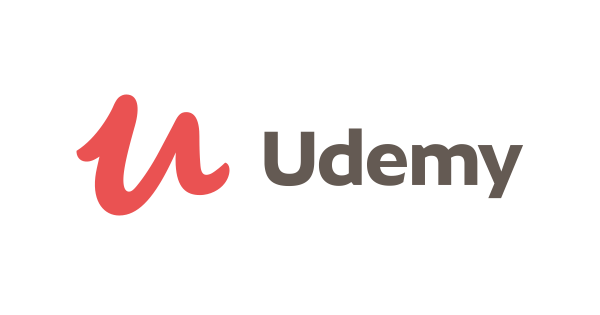
One of the great alternatives to Coursera is Udemy. It offers a wide array of educational lessons, from non-degree courses to certificate courses. Udemy also gets constant updates with its lessons. This ensures you that what you are learning at Udemy is on par with today’s trends and topics.
If they could just make their courses more affordable, this can be a great alternative against Coursera. They only market individual courses to individual customers. This may turn out to be more expensive considering Coursera has a subscription-based enrollment. Udemy also gives out certificates once you finish your course.
The problem is that Udemy is not that highly recognized by employers. This can be problematic especially if you are shifting your career path.
Khan Academy

As they say, some of the best things in life are free, and Khan Academy offers just that. This MOOC provider lets you study academic lessons for free. And even if it is free, you get your lessons ads-free. This means less distraction when learning your lessons online. You also don’t need to sign up for this MOOC, thus lessening the hassle of logging in.
Khan Academy is catered more to youngsters who are still studying at school, though. The scope of their subjects ranges from mathematics to marketing and economics. This is beneficial if you are trying to refresh your academic knowledge but don’t expect any certifications from this.
edX

If you are aiming to study academic courses without enrolling in a university, edX has it right on the spot. edX is known to be a reputable online institution because it is founded by renowned lecturers from Harvard University and the Massachusetts Institute of Technology (MIT). You don’t have to worry when getting a reputable certification from them. Employers will surely accredit your certificate for edX is known to many employers. Most of their lectures are delivered university-level thus the high quality of content delivery.
Navigating through their course offerings can be a bit complicated. It is due to the confusing names given to courses that give almost the same content. This can take time to get used to but it promises a worthy deliverance of content.
The Bottom Line
We can boldly claim that Coursera is one of the best MOOC providers out there. Despite its complicated pricing and at times shady customer support, its wide variety of courses gives it an edge against its competitors.
It also offers a plethora of courses for free, making it accessible to everyone without hurting your pockets. This brings “free education” to the next level for it can be accessed from your PC to your smartphone anytime and anywhere. And if you are planning to shift careers, Coursera is a great springboard for you, thanks to its lectures carefully prepared and delivered by renowned institutions.
If you’re a lecturer, perhaps you want to check out Google Classroom. This education app gives you a smooth classroom experience even with this pandemic still lingering on.
